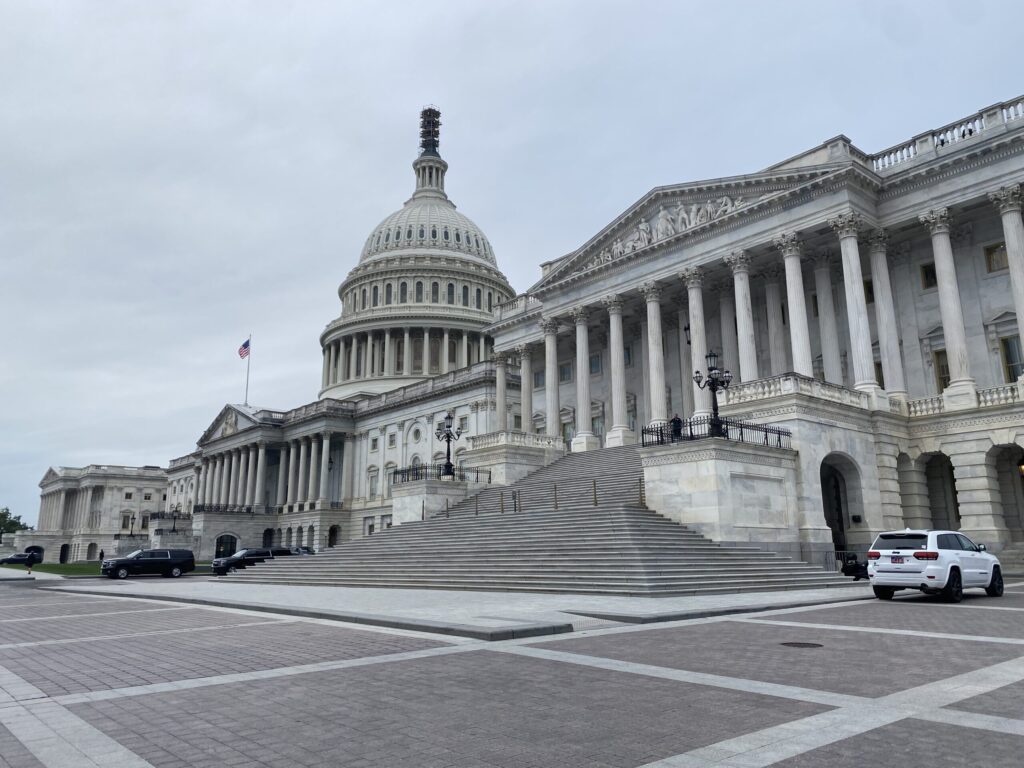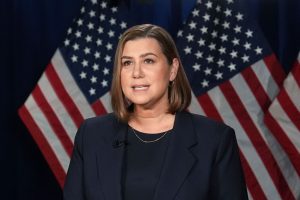
The U.S. Capitol. (Photo by Jennifer Shutt/States Newsroom)
WASHINGTON — U.S. senators emerged from a briefing with federal law enforcement officials Tuesday saying they’ll likely boost funding on safety and security for members and their families in an upcoming government funding bill.
The hour-long briefing by U.S. Capitol Police and the Senate sergeant-at-arms followed the weekend assassination of a Minnesota state lawmaker and her husband as well as the attempted murder of a state senator and his wife.
The gunman had a list of Democratic elected officials, including members of Congress, and their home addresses, which renewed long-standing security concerns among lawmakers.
Senate Majority Leader John Thune, R-S.D., spoke about the shootings during a floor speech shortly after the meeting, pressing for an end to political violence.
“I’m profoundly grateful to local law enforcement that the alleged shooter is in custody and I look forward to seeing him prosecuted to the fullest extent of the law,” Thune said. “There is no place for this kind of violence in our country. None.”
Senate Democratic Leader Chuck Schumer, of New York, said that California Democrat Adam Schiff and Pennsylvania Republican Dave McCormick suggested during the closed-door meeting that Congress bolster funding for member safety.
“The Capitol Police and the sergeant at arms gave a very detailed discussion of how they can protect members here, back in our states, at our homes, in our offices,” Schumer said. “The violence, threats against elected officials, including people in the Senate, has dramatically increased, and that means we need more protection. We need more money.”
The USCP and other law enforcement agencies, Schumer said, are taking some immediate steps to bolster security, though he said “there are other things that will take a little while with more resources.”
Schumer also called on political leaders to be more cautious about how they discuss policy differences.
“The rhetoric that’s encouraging violence is coming from too many powerful people in this country,” Schumer said. “And we need firm, strong denouncement of all violence and violent rhetoric — that should be from the president and from all of the elected officials.”
Minnesota Democratic Sen. Tina Smith called the meeting “very productive,” but didn’t want to elaborate.
“I’m not going to comment any more,” Smith told reporters. “I think it’s important for members’ safety that we don’t talk a lot about what is being done to keep us safe in order to keep us safe.”
Support for funding increase
Senate Appropriations ranking member Patty Murray, D-Wash., said she expects the panel will increase funding for USCP in the bill that covers the upcoming fiscal year.
“I believe we need to do that,” Murray said.
Delaware Democratic Sen. Chris Coons said the current situation is “incredibly concerning, gravely concerning.”
“And I appreciate the prompt and thorough bipartisan response,” Coons said.
Republican Sen. Tommy Tuberville, who is running for governor in Alabama, said USCP will increase its security measures for members of Congress.
“They’re going to try to do as much as they can, that’s about it,” he said after the briefing. “You know, security at home and here.”
Asked whether there’s a legislative solution or anything lawmakers can do, Oklahoma GOP Sen. James Lankford told reporters “there’s a cultural solution.”
Sen. Martin Heinrich did not go into details about the meeting but said “everybody is having a very robust discussion about the sort of heightened security, dangerous environment we’re all operating in right now and what to do about that, both tactically to meet some of that threat, but also how to reduce the volatility of the environment that we’re in every day.”
The New Mexico Democrat is the ranking member on the Senate Appropriations Legislative Branch Subcommittee, which funds USCP and the sergeant at arms.
Asked about boosting USCP funding, Heinrich said this is “an obvious place that lawmakers will look,” but added that senators should be strategic about funding.
“We also just need to be smart and targeted about this,” he said. “There are a lot of things that can be done that don’t require a lot of funding that would reduce the scale of the target that is on the backs of anybody in public office these days.”





